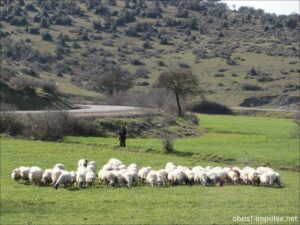‘We harvested a 38 kg pumpkin. Do you have any idea how we could share the 30 kg we don’t need with others?’ someone asked us by email. We had already distributed 20 kg of grapes from a single vine. Autumn is the time for harvesting and giving thanks. We can enjoy and share what has been produced in the months before.
In giving thanks, we open our eyes to the wonders of everyday life. In giving thanks, we share the fascination of life with each other.
Dietrich Bonhoeffer wrote in July 1940 in reference to Psalm 50:23: ‘God shows the way to the thankful’. He had previously said: ‘Ingratitude begins with forgetfulness, forgetfulness leads to indifference, indifference leads to discontent, discontent leads to despair, despair leads to curse’. ‘Ingratitude stifles faith, blocks access to God’ (Gesammelte Schriften, Vol. III).
Zwingli from Toggenburg translated Psalm 50:23 as follows: ‘He who offers thanks honours me and chooses the way in which I let him see God’s help.’
Giving thanks is not always easy for us. But when we get involved, we discover more and more fascinating things. Giving thanks frees us to rediscover God’s help and presence.
In the parable of the merciful father in Luke 15, Jesus has painted a new picture for us of how God waits for us to come to him like the younger son. He encourages the ungrateful older son to become like him.
The more we consciously practise gratitude, the more we will realise it. What we nurture grows and we reap what we sow.
Professor Robert A. Emmons has been researching the topic of gratitude for 20 years. He summarises: People who regularly cultivate gratitude experience a range of measurable and lasting benefits of a psychological, physical, interpersonal and spiritual nature: health, a sense of wholeness and well-being and greater satisfaction in relationships. This confirms that it is worth investing in gratitude.
Hanspeter Obrist, Sunday Thought, Toggenburger Tagblatt, 5 October 2024
 Jesus says in John 10:11, “I am the good shepherd. The good shepherd lays down his life for the sheep.”
Jesus says in John 10:11, “I am the good shepherd. The good shepherd lays down his life for the sheep.” I shall not lack anything “lo achsar” (לֹא אֶחְסָר). God gives us enough hints to help us to make good choices that are in accordance with His will.
I shall not lack anything “lo achsar” (לֹא אֶחְסָר). God gives us enough hints to help us to make good choices that are in accordance with His will.